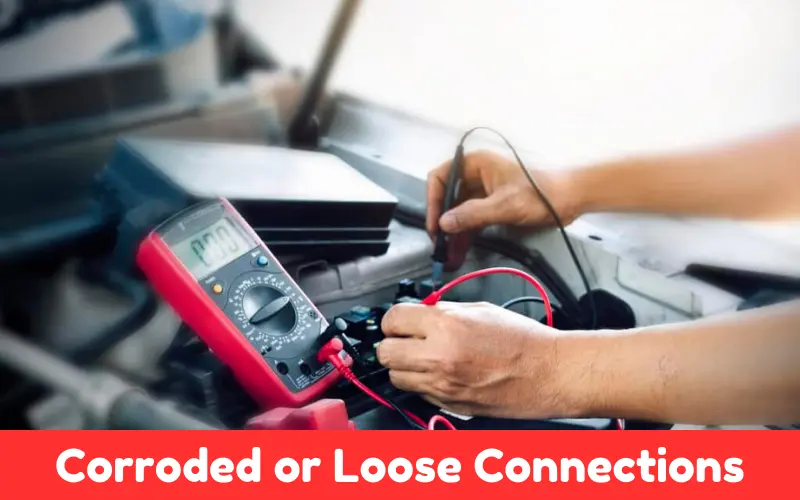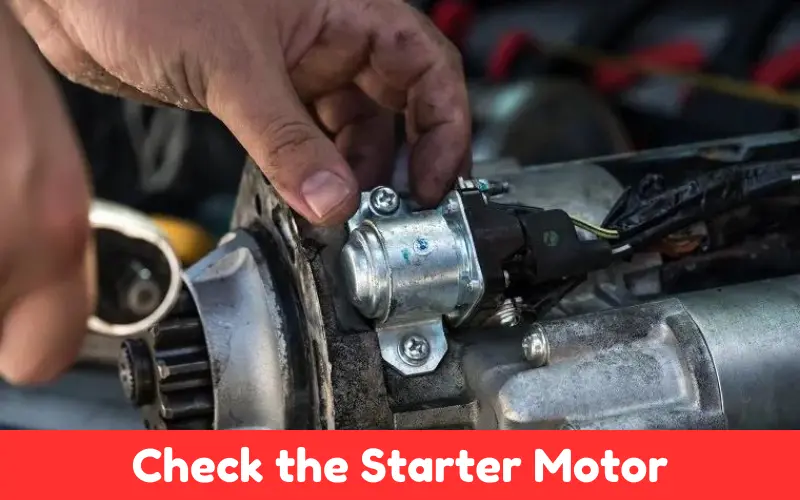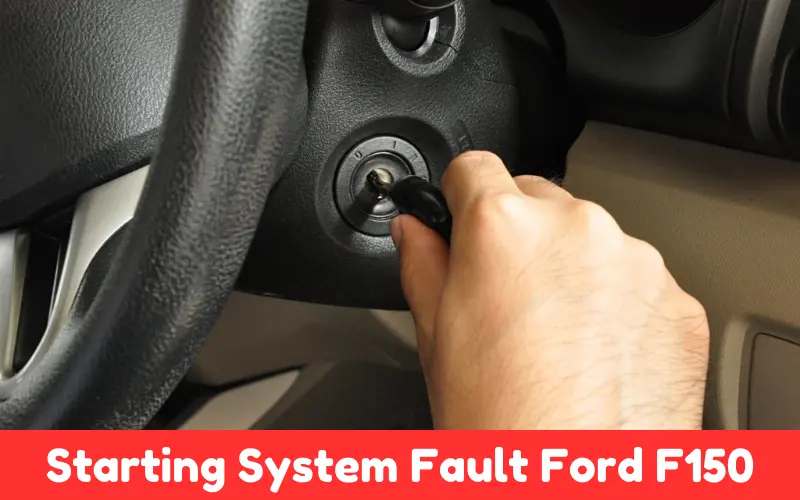The Ford F150 is a perfect vehicle for anyone to own, with its toughness, performance, and reliability being one of the best out there. However, like anything else, all vehicles have problems after some time of use.
One issue that some specific Ford F150 vehicles experience is a start system fault. This can cause some major frustration when caught out of nowhere, as sometimes these vehicles fail to start.
In this blog post, I will explain what this fault is, what could have caused it, and some possible steps you can take to clear the starting system fault Ford F150.
Article Summary
What Is Starting System Fault?
If a Ford F150 shows the ‘Stop Find Starting System Fault,’ it means that its starting system has a problem.
The starting system is important because it consists of the battery, starter motor, ignition switch, and their associated wiring. Once one of these parts fails, the truck may not start, or it will start with difficulty.
Causes of Starting System Fault Ford F150
Your Ford F150 may face starting problem anytime and anywhere. Some of the main causes are given below:
1. Low Battery
The most common cause is a weak or dead battery, which can happen naturally over time from an older battery, a light left on, or from some other electrical problem.
2. Starter Motor Issues
The starter motor is the component of your truck that is responsible for turning the engine over. If it starts to fail, you might hear a clicking sound instead of the engine turning over when you turn the key to start, or you might hear and feel nothing at all.
3. Poor Connection of the Ignition Switch
The ignition switch connects and disconnects the electrical flow to the starter. It could be a faulty part, causing it not to send the signal to start the engine.
4. Corroded or Loose Connections
Corrosion or loosening of a joint in the wiring may keep the starting system from working at all. Often, carbon buildup will occur at the battery terminals or connections to the starter.

5. Bad Alternator
Although, strictly speaking, not part of the starting system, a bad alternator can cause battery problems that cause starting problems.
Diagnosing the Problem
Diagnosing any problem is one of the crucial job. After facing any problem you need to diagnose for solving the issue. Some diagnosing methods are described below.
Check Battery
Make sure that the battery terminals are clean and the connectors are tight. Use a multimeter to check the battery voltage. A healthy battery should read about 12.6 volts.
If the voltage is lower, then sometimes a jump start can solve the problem. In more serious cases, you may need to replace the battery.
Check the Starter Motor
When you turn the key, listen for the clicking noise of the starter motor from inside the engine compartment. If you hear the click but the engine does not crank, the starter motor could be at fault.

Tap the starter motor on the end (which should have a harness connection to it) with a hammer while someone turns the key. If this produces the sound of a loose start, the starter motor is likely the problem.
Bypass the Ignition Switch
Wiggle the key as you try to start the truck. If the truck starts intermittently, the ignition switch is weak.
Wiring and Connections
Look for corrosion or plugs and clips coming loose around the battery and the starter motor. You can clean corrosion and retighten connections.
Check the Alternator
Put your voltmeter across the alternator to read the voltage that it is outputting. A healthy alternative will read 13.8 to 14.4 volts with an engine running. Outside of this range and you nearly always need to look at the alternator.
When To Seek Professional Help
If you’ve gone through the basic troubleshooting steps and all else fails, then you’ve likely got a serious problem. It’s time to take the car to a mechanic who’s better trained and equipped to perform a more thorough diagnostic to correctly identify what caused the fault and repair it accordingly.
How To Avoid Starting System Fault
Regular Checking: Check every system at least twice. Make sure that all the engine parts are functioning properly for starting your F150.
Regular Maintenance: Do maintenance to F150 every few days to ensure that all F150 systems are working at full capacity.
Battery Care: Keep the battery clean and check the charge regularly, particularly prior to long trips or during extreme weather.
Wiring Inspections: Regularly inspect and clean the battery terminals and wiring to prevent corrosion.
FAQs on Starting System Fault Ford F150
What Should I Do If My Ford F150 Doesn’t Start at All?
First, check the battery to make sure it holds a full charge and the terminals are clean and connected securely to the battery. If the battery checks out OK, listen for a clicking noise when you turn the key. A clicking sound might indicate that the starter motor or ignition switch is faulty. If you don’t hear any sound, the problem is in the battery, starter, or ignition system. If you don’t know what you’re looking for or can’t fix it yourself, take it to a mechanic.
Why Do My Car Won’t Start When I Turn the Ignition Key On?
A battery problem will either give a low reading usually quite low on a multimeter connected to the battery, or the battery itself will be unusually low or dead. If you jump start the car, and the vehicle starts but quits later, the battery is the problem and should probably be replaced. If you hear a clicking noise when you turn the key, but the engine doesn’t start cranking over, the problem is more likely the starter motor. A gentle tap on the starter motor can sometimes turn it into a functioning machine when someone tries to turn the key.
What Does It Mean If My F150 Starts Intermittently?
This is often where the problem starts with ignition related issues. Almost certainly, the problem lies with the ignition switch or one of the connections to it. If you have to jiggle the key or the gearshift to get an intermittent start, the switch is probably at fault. Perhaps it isn’t seated, right? Or maybe some connections are loose, or have become corroded (especially at the battery or the starter motor), or have loosened up over time. Sometimes a dust shower and a dose of secure tightening is all that’s needed, but if it’s all for naught, you may have to side with the mechanics and take your car to the shop.
Can A Faulty Alternator Cause Starting System Fault?
Yes, in the way that a faulty alternator would create charging and thus starting difficulty. The alternator’s purpose is to charge the battery while the engine is running. If it is not doing its job, then the battery may not stay charged and therefore would become more and more weak till it could go dead. If you suspect that the alternator is the culprit, the voltage it is putting out can be checked with a multimeter. If it is not reading within the proper range of 13.8 to 14.4 volts, then you may have a problem with the alternator, and it should be repaired or replaced.
How Can I Prevent Starting System Faults in My Ford F150?
Be sure to have your battery periodically checked or cleaned and replace it every 3 to 5 years. Inspect and clean battery terminals and connecting wires as a regular part of your maintenance to remove or lessen the effects of any battery acid that tends to collect there and corrode the metal that leads to the starter motor. Set a schedule for taking your car in for regular check-ups for all the components of your starting system, including the starter motor and the ignition switch. Never delay electrical system maintenance, which can lead to more serious problems in the future.
Conclusion
Your Ford F150 might feel like something that just keeps happening, sometimes without any obvious reason. Meanwhile, it’s leaving you standing in the dark or getting a late start on things because you can’t drive.
Maybe it’ll save you a bit of time and aggravation the next time it lights up that “Starting System Fault” message. Hopefully, it will happen less often.
If your truck goes out of warranty (often after the first three years), consider getting it checked out by an independent mechanic rather than the dealer. That could save you some money.
At any time, your truck can just be broken without any apparent reason, like a typical relationship. Your best option is to acknowledge the reality and hope that it passes quickly. With any luck, the problem will finally fade away and be solved without you ever having to spend a fortune on the plumber mechanic’s bill.

